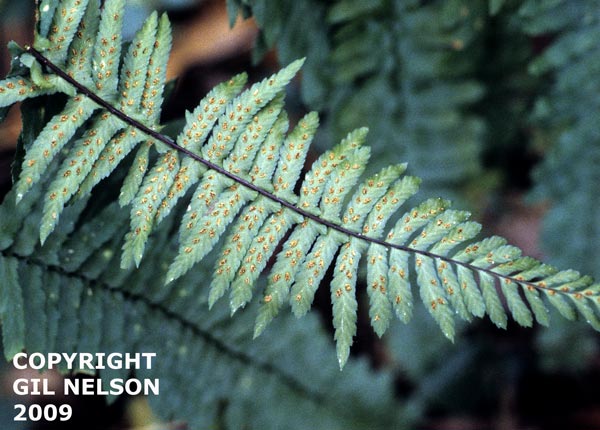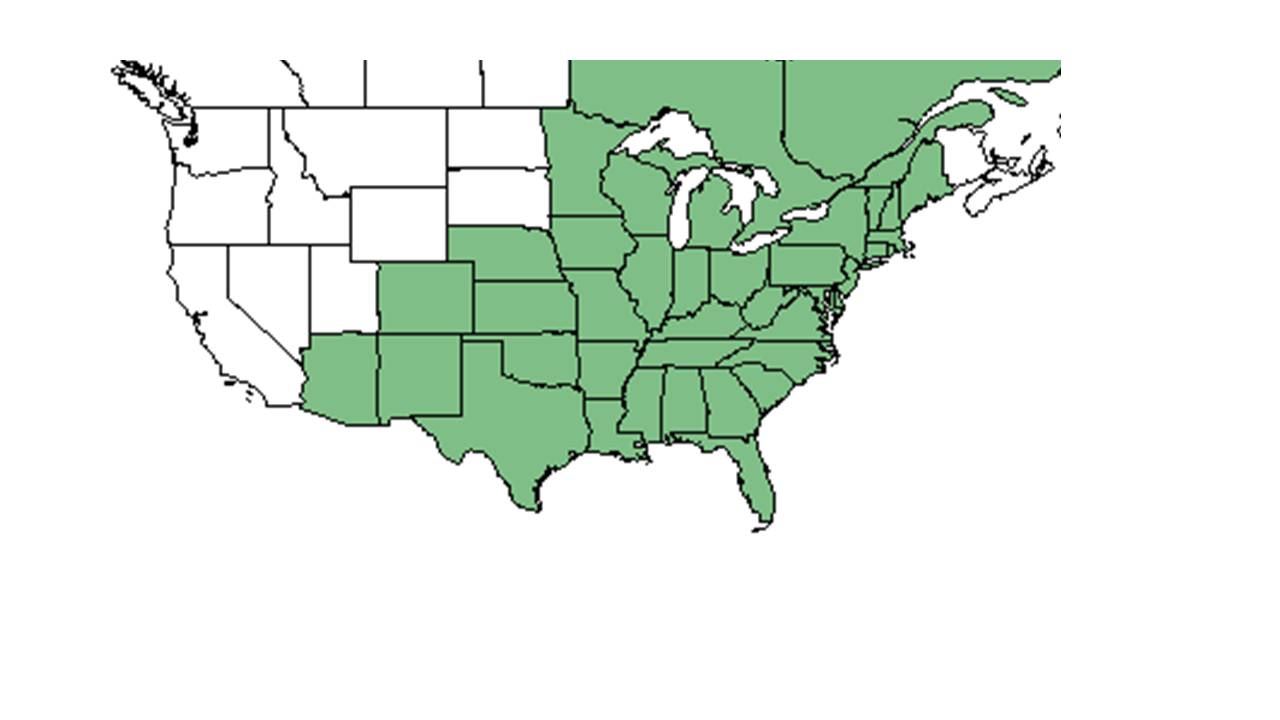Difference between revisions of "Asplenium platyneuron"
Krobertson (talk | contribs) (→Distribution) |
Krobertson (talk | contribs) |
||
| Line 31: | Line 31: | ||
==Ecology== | ==Ecology== | ||
===Habitat===<!--Natural communities, human disturbed habitats, topography, hydrology, soils, light, fire regime requirements for removal of competition, etc.--> | ===Habitat===<!--Natural communities, human disturbed habitats, topography, hydrology, soils, light, fire regime requirements for removal of competition, etc.--> | ||
| − | Habitats include rocks, rotting logs, swamps, marshes, crotches of hardwood trees, and savannas<ref name="daily">[[http://www.dailypress.com/features/family/home-garden/outdoors/diggin-in-blog/dp-native-fern-ebony-spleenwort-or-asplenium-platyneuron-20120104-story.html]]Daily Press. Accessed: April 1, 2016</ref><ref name="fsu">Florida State University Robert K. Godfrey Herbarium database. URL: http://herbarium.bio.fsu.edu. Last accessed: June 2014. Collectors: Loran C. Anderson, Karen MacClendon, R.K. Godfrey, Wilson Baker, R. F. Doren, Roy Komarek, and Jeffrey M. Kane. States and Counties: Florida: Wakulla, Calhoun, Franklin, Leon, and Gadsden. Georgia: Grady and Thomas.</ref> | + | Habitats include rocks, rotting logs, swamps, marshes, crotches of hardwood trees, and savannas.<ref name="daily">[[http://www.dailypress.com/features/family/home-garden/outdoors/diggin-in-blog/dp-native-fern-ebony-spleenwort-or-asplenium-platyneuron-20120104-story.html]]Daily Press. Accessed: April 1, 2016</ref><ref name="fsu">Florida State University Robert K. Godfrey Herbarium database. URL: http://herbarium.bio.fsu.edu. Last accessed: June 2014. Collectors: Loran C. Anderson, Karen MacClendon, R.K. Godfrey, Wilson Baker, R. F. Doren, Roy Komarek, and Jeffrey M. Kane. States and Counties: Florida: Wakulla, Calhoun, Franklin, Leon, and Gadsden. Georgia: Grady and Thomas.</ref> It also grows in disturbed areas such as fallow fields and near field edges. It does well in moist, loamy sand in fully shaded environments to areas with full sun.<ref name="fsu"/> |
| − | Associated species include cypress, moss, magnolia, oak, and beech<ref name="fsu"/> | + | Associated species include cypress, moss, magnolia, oak, and beech.<ref name="fsu"/> |
===Phenology===<!--Timing off flowering, fruiting, seed dispersal, and environmental triggers. Cite PanFlora website if appropriate: http://www.gilnelson.com/PanFlora/ --> | ===Phenology===<!--Timing off flowering, fruiting, seed dispersal, and environmental triggers. Cite PanFlora website if appropriate: http://www.gilnelson.com/PanFlora/ --> | ||
Revision as of 18:45, 10 August 2016
| Asplenium platyneuron | |
|---|---|

| |
| photo by Gil Nelson | |
| Scientific classification | |
| Kingdom: | Plantae |
| Division: | Pteridophyta - Ferns |
| Class: | Filicopsida |
| Order: | Polypodiales |
| Family: | Acanthaceae |
| Genus: | Asplenium |
| Species: | A. platyneuron |
| Binomial name | |
| Asplenium platyneuron (L.) Britton, Sterns & Poggenb. | |

| |
| Natural range of Asplenium platyneuron from USDA NRCS Plants Database. | |
Common name: Ebony Spleenwort
Contents
Taxonomic notes
Synonyms: Asplenium platyneuron var. platyneuron; A. platyneuron var. bacculum-rubrum (Featherman) Fernald; A. platyneuron var. incisum (Howe ex Peck) B.L.
Description
A description of Asplenium platyneuron is provided in The Flora of North America.
It can be easily confused with Christmas fern (Polystichum acrostichoides), however, the stem of Christmas fern is green and scaly and the spores cover a back of a leaflet.[1]
Distribution
It is one of the most common and widespread of the eastern North American spleenwort.[2] Listed as critically imperiled in Arizona and Colorado.[3]
Ecology
Habitat
Habitats include rocks, rotting logs, swamps, marshes, crotches of hardwood trees, and savannas.[4][5] It also grows in disturbed areas such as fallow fields and near field edges. It does well in moist, loamy sand in fully shaded environments to areas with full sun.[5]
Associated species include cypress, moss, magnolia, oak, and beech.[5]
Phenology
Reproduces with proliferating buds that form near the base of the stipe and when covered with soil, can grow into new individuals as the frond that bore them dies. Also propagates by spores and can hybridize with other spleenworts[6].
Fire ecology
It does well in fire dependent environments[5].
Use by animals
Is fed on by two aphids: Amphorophora ampullata and Idiopterus nephrelepidis[7].
Conservation and management
Cultivation and restoration
Photo Gallery
References and notes
- ↑ [[1]]Minnesota wildflowers. Accessed: April 1, 2016
- ↑ Taylor, W. C., R. H. Mohlenbrock, et al. (1976). "Variation in North American Asplenium platyneuron." American Fern Journal 66(2): 63-68.
- ↑ [[2]]NatureServe. Accessed: April 1, 2016
- ↑ [[3]]Daily Press. Accessed: April 1, 2016
- ↑ 5.0 5.1 5.2 5.3 Florida State University Robert K. Godfrey Herbarium database. URL: http://herbarium.bio.fsu.edu. Last accessed: June 2014. Collectors: Loran C. Anderson, Karen MacClendon, R.K. Godfrey, Wilson Baker, R. F. Doren, Roy Komarek, and Jeffrey M. Kane. States and Counties: Florida: Wakulla, Calhoun, Franklin, Leon, and Gadsden. Georgia: Grady and Thomas.
- ↑ [[4]]inaturalist.Accessed: April 1, 2016
- ↑ [[5]]Illinois Wildflowers. Accessed: April 1, 2016